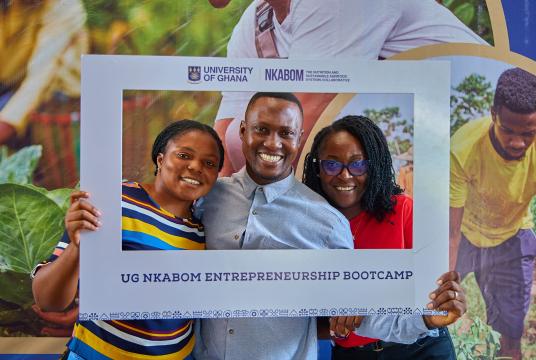The UG Nutrition and Sustainable Agri-food Systems Collaborative Project (UG Nkabom) has launched an initiative to support the incubation of 3000 agribusiness start-ups over the next five years. The first cohort of this initiative, about 200 students and graduates of the University of Ghana, have joined an entrepreneurship bootcamp launched at a meeting of nutrition and agrifood systems stakeholders in Accra. The event brought together partners from the University, McGill University, Mastercard Foundation. UG Nkabom Collaborative has contributed to training scholars across Africa and beyond.
Over seven days, the young entrepreneurs will be guided to hone their business ideas, and connected with industry players to expose them to the intricacies of the sector. The project would also offer mentorship support to 100 students and connect them to over twenty-five (25) industry experts. It would also provide the young entrepreneurs with support to ensure regulatory compliance and funding access.
"The collective presence of our key stakeholders underscores the power of partnership in addressing local challenges which lie at the heart of this initiative.”

These sentiments from the pro-vice chancellor of the University of Ghana (UG), Professor Felix Ankomah-Asante anchored the vision shared by the collaborating partners at the launch of the Entrepreneurship Bootcamp In his remarks, Professor Ankomah-Asante, who represented the Vice-Chancellor, Professor Nana Aba Appiah-Amfo, aligned the UG Nkabom initiative with three of the University’s five strategic pillars for the academic year: transformative student experience, engagement and partnerships, as well as sustainable resource mobilisation. He emphasised the initiative’s relevance to the agri-food value chain, describing it as a, “transformative intervention one that not only helps bridge unemployment gaps but also creates sustainable entrepreneurship opportunities while contributing to national nutrition and food security”. Providing an overview of the Collaborative’s vision and intended impact, the Principal Investigator, Professor Richmond Aryeetey, highlighted three pivotal work streams education, access and success, and entrepreneurship as the core drivers of a youth-led, nutritious, sustainable, and thriving agri-food system. These pillars aimed to equip young people with relevant knowledge and skills, ensure inclusive participation and retention in agri-food-related opportunities, as well as foster innovation and enterprise development across the value chain. He charged the foundational cohort of students of the UG Nkabom project to build alliances among themselves, and with their own communities to make the agri-food ecosystem an attractive source of livelihood.
On his part, the Entrepreneurship Pillar Lead, Professor George Acheampong, outlined its goal of cultivating youth-led agribusinesses through mentorship and market access. “We’re not just creating businesses; we’re nurturing a new generation of entrepreneurs equipped to compete globally while driving inclusive growth in Ghana’s agri-food sector,” Professor Acheampong remarked.
In a brief statement, a representative of the Mastercard Foundation, Madam Emmanuella Alimlim, stressed that the Nkabom initiative reflected the Foundation’s commitment to supporting African youth in accessing dignified and fulfilling work. She noted that partnering with the University of Ghana reinforced the Foundation’s collaborative efforts with key stakeholder institutions, including higher educational institutions, to drive workforce development across the continent.


